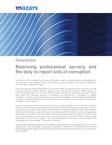
Balancing professional secrecy and the duty to report acts of corruption
Such bill proposes certain amendments to Law 599 of 2000, by means of which "the Criminal Code is issued", and to Law 906 of 2004, by means of which "the Criminal Procedure Code is issued", in order to counteract the main conducts that have been identified as generating corruption. Among them, there are measures focused on combating the phenomenon of corruption in political campaigns, in public procurement processes, as well as the obligation to report facts associated with corruption, the front man to the detriment of the public administration, the concealment or destruction of evidence, among others.
Given the extensive and diverse nature of the issues raised in the bill, we will proceed to analyze Article 4 of the bill, which seeks to add Article 325C to Law 599 of 2000, which provides that: "Lawyers, accountants, tax auditors and heads of internal control, who being obliged to report under the terms defined by the Ministry of Justice and Law, omit compliance with the reports of unusual or suspicious operations of corruption to the Information and Financial Analysis and Information Unit (UIAF), shall incur in imprisonment of three (3) to six (6) years and a fine of one hundred (100) to three hundred (300) legal monthly minimum wages in force, provided that the conduct does not constitute a crime punishable by a higher penalty. "(Emphasis out of text).
The purpose of the proposed article is to establish a legal obligation for professionals who, on a more regular basis, have knowledge of operations suspected of corruption or constituting crimes against public administration, specifying criminal and disciplinary sanctions for those who fail to comply with such obligation.
The obligation to report facts associated with corruption has legislative and jurisprudential antecedents in the framework of the prevalence of this obligation over professional secrecy. For the specific case of the statutory auditor, Article 7 of Law 1474 of 2011, established as a cause for cancellation of the registration of a Public Accountant, the failure to comply with the legal obligation to report or bring to the attention of the authorities the acts of corruption found in the exercise of his office.
In this regard, the Constitutional Court in Ruling C-200 of 2012, M.P. Jorge Ignacio Pretelt Chaljubd determined that: "[...] the work of the statutory auditor is not exhausted in the simple advice or preservation of private expectations. His is a task that involves interests that go beyond private initiative and concerns, therefore, the economic and social stability of the community [...]".
On the other hand, the Constitutional Court in judgment C-301 of 2012, M.P. Jorge Ignacio Pretelt Chaljubd determined, with respect to professional secrecy, the following: "Professional secrecy is an essential aspect in the exercise of certain professions, especially those linked to very personal services [...] additionally, from the angle of the professional, it can be stated that there is a right-duty to preserve secrecy, since, otherwise, if he is compelled to reveal what he knows, he will irremissibly lose the trust of his clients, his prestige and his source of livelihood."
However, the Constitutional Court includes in its jurisprudence two positions: on the one hand, that which establishes the duty to report that professionals who, during the exercise of their profession, have greater knowledge regarding operations suspected of corruption or constituting crimes against public administration, and on the other hand, that which states the importance of professional secrecy, determining that this is an essential aspect in the exercise of professional activity, since its purpose is to protect not only the prestige of the professional, but also the bonds of trust that he has created with his clients.
Additionally, said Corporation provides in Ruling C-301 of 2012 that "the lawyer who by virtue of the professional relationship with his client has known of the future commission of a crime is in a borderline situation between his sanction for the disclosure of the secret and his conviction for failure to report, failure to provide assistance or commission by omission for not having prevented the commission of the crime. In these cases, no general rules can be formulated, but rather particular weighing criteria must be taken into account, which are specific to the state of necessity".
The Corporation concludes that the weighting criteria are summarized to establish "(i) the existence of a present danger to the legal right derived from the commission of the crime that is intended to be avoided with the disclosure of the secret; (ii) a weighing judgment between the legal right safeguarded and the professional secret and (iii) the disclosure of the secret must constitute a suitable means to face the danger according to the criteria of necessity, adequacy, proportionality and reasonableness". The foregoing will ensure compliance with the regulations in force and the constitutional precepts.
All in all, it can be glimpsed that the Constitutional Court in its jurisprudence establishes the importance of the duty of denunciation that professionals have in the exercise of their work and the importance of professional secrecy, on the occasion of the exercise of their profession, and not the supremacy of one over the other.
In this sense, the bill in question intends to ratify the importance of the principle of solidarity enshrined in Article 95 of the Political Constitution, by extending to lawyers and heads of internal control the obligation of statutory auditors to denounce facts associated with corruption.


